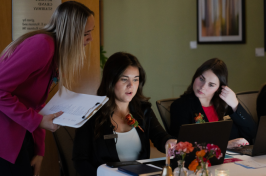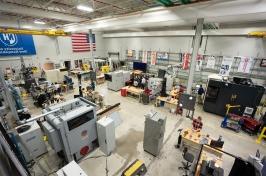
Masami Dustin ‘21
When you came to UNH had you planned on weaving in a focus on social innovation or sustainability into your major and why?
I knew since my junior year of high school that I would want to major in business come college, though it wasn’t until recently that I found a true passion for social innovation. My entire life, I’ve always been interested in helping people, and business in my eyes was always the most impactful way to reach large groups of people. I was never sure prior to college how I wanted to pursue this, but I knew I would make it happen somehow.
What social innovation or sustainability classes, programs or experiences have you been involved in and how did they challenge you to think differently about what a career in business or economics might be?
The experience that really altered my state of mind when it comes to business, best practices, and capitalism as a whole was Semester in the City (Spring 2020). I was placed in a cohort with more than 40 other amazing, diverse, and driven humans who are seeking the same permanent change that I am, and as I learned with and from them, my understanding of systems in both America and the world completely shifted. Hearing their stories and empathizing with their vastly unique backgrounds while simultaneously taking classes focused on social justice and equitable systems across industries opened my eyes to a plethora of tragic, real-world problems that impact millions of Americans daily, just not me.
During this time, I was partnered with FamilyAid Boston, one of the largest providers for homeless families in the Commonwealth. Before this, I had never known about the massive issue of intergenerational poverty that impacts thousands of children and parents just 45 minutes away from my small, privileged hometown, or the fact that 90% of these families are families of color with the large majority of them being headed by single moms. That semester really ingrained in my head that I was born with an incredible amount of my own privilege (half-white, cis-gendered male with financial stability and little physical and mental health issues) that so many others will never have, and it is up to those with privileges like these to start taking a stand for voices that have been silenced and for people who don’t have the resources to make high-impact change on their own.
What do you aspire for in your career when you graduate from Paul College? How do you see what you have learned in regard to social innovation and sustainability playing into your career?
I used to aspire for many different things in my career upon my graduation from Paul College. I wanted to help people, but I was willing to limit that if it meant I could also be wealthy, live an overall relaxing life, and maybe even become a little famous. However, I know now that this is ignorance in its fullest. I have the choice to live in a “bubble,” work solely for myself, my needs, and my wants, and ignore outside problems. But this is a choice that many, many others don’t have (and will never have), and it’s a choice that I do not deserve to make over anybody else. So my decision in this choice isn’t the same as it used to be – I will not only have social innovation and sustainability play into my career, but my hope is that these two things will be my career, and that I can use everything I’ve learned to make this country more just and equitable for everyone.
Do business leaders have the power to change their communities and the world through socially responsible and sustainable actions, and how do they do that while still running competitive and profitable businesses?
Absolutely. In fact, I think in a capitalistic society and particularly in America, business leaders hold most of the power in leading and making effective, lasting change, even over many local and state governments. Large, private businesses in this country run the economy, as we’ve truly seen throughout COVID, and the economy is what government focuses on most. Maybe this is why some people are weary about how having more than one bottom-line (such as “planet” and “people” over profit) may impact the viability of a business, but it must be recognized that the world today is immeasurably different than even 20-30 years ago. Today, bottom lines are not mutually exclusive. Being sustainable and socially responsible is actually profitable for many companies as younger generations have prioritized these themes in their own personal lives. Across the nation, people are beginning to have a more collectivist mindset rather than an individualistic one, and although this isn’t always reflected in our day-to-day actions or through the actions of the government, businesses have the opportunity to leverage this to both make money and make change.
No matter what your career brings, do you think it is important for all business students to have some exposure to programming and education in social innovation and sustainability
I don’t just think that it is important for all business students to expose themselves to some education in social innovation and sustainability (and all connecting topics), but in my mind it is IMPERATIVE for ALL STUDENTS to expose themselves to A LOT of these concepts, regardless of career/industry/etc.. Social innovation isn’t just a made-up business concept that was coined to garner a new target market, it is based off of legitimately helping to work against the huge number of barriers placed against certain groups of people and/or the environment that were produced as natural consequences of capitalism. And these barriers aren’t just seen in the business world – they are seen in every nook and cranny in the nation, and they impact more people than any of us will ever be able to grasp. Regardless of what industry you go into, you must take the necessary steps to educate yourself so you can get a sense of whose lives you are impacting, because no matter what you do, your work will impact others.
-
Written By:
Sharon Keeler | Peter T. Paul College of Business and Economics | sharon.keeler@2fitfashion.com | 6038623775



















































